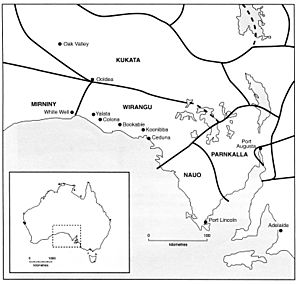Nukunu language facts for kids
Quick facts for kids Nukunu |
||||
|---|---|---|---|---|
| Region | South Australia | |||
| Ethnicity | Nukunu | |||
| Extinct | ca. 2000 | |||
| Language family |
Pama–Nyungan
|
|||
| Writing system | Latin | |||
| AIATSIS | L4 | |||
|
||||
Nukunu (also called Nugunu and other names) is an Aboriginal language from South Australia. It was once spoken by the Nukunu people on the Yorke Peninsula. Sadly, by the year 2000, there were no longer any native speakers of Nukunu. However, since 2017, there has been a special program to help bring the language back and keep it alive for future generations.
Contents
Different Names for Nukunu
Like many old languages, Nukunu has been known by several different names over time. This often happens because different groups of people or language experts might spell the name differently or hear it in slightly varied ways.
Some of the names used for this language include:
- Nukuna, Nokunna, Noocoona, Nookoona, Nuguna, Nukana, Nukunnu, Njuguna
- Doora
- Pukunna
- Tjura, Tyura
- Wallaroo, Warra
- Wongaidya (which means 'to speak')
Where Nukunu Fits In
Nukunu belongs to a very large group of languages called Pama-Nyungan. This is one of the biggest language families in Australia. Nukunu is closely related to other languages spoken nearby, such as Narungga, Kaurna, and Ngadjuri. These languages share similar sounds and grammar rules.
Sounds of Nukunu
Every language has its own special set of sounds, and Nukunu is no different. The way words are pronounced is called phonology.
Vowel Sounds
Nukunu has three main vowel sounds, similar to the 'a' in "car", 'i' in "sit", and 'u' in "put". What's interesting is that each of these vowels can be spoken in two ways:
- A short sound
- A long sound
The length of the vowel can actually change the meaning of a word!
Consonant Sounds
The Nukunu language uses many different consonant sounds. These sounds are made using various parts of your mouth, like your lips, tongue, or the back of your throat. Nukunu has sounds similar to 'p', 'k', 'm', 'n', and 'l'. It also has some unique sounds that are common in Aboriginal languages. For example, some sounds are made by curling the tongue back in the mouth.
Nukunu is part of the Thura-Yura language group. Unlike some other languages in this group, Nukunu kept its original 'th' and 'k' sounds at the beginning of words.
 | Delilah Pierce |
 | Gordon Parks |
 | Augusta Savage |
 | Charles Ethan Porter |


